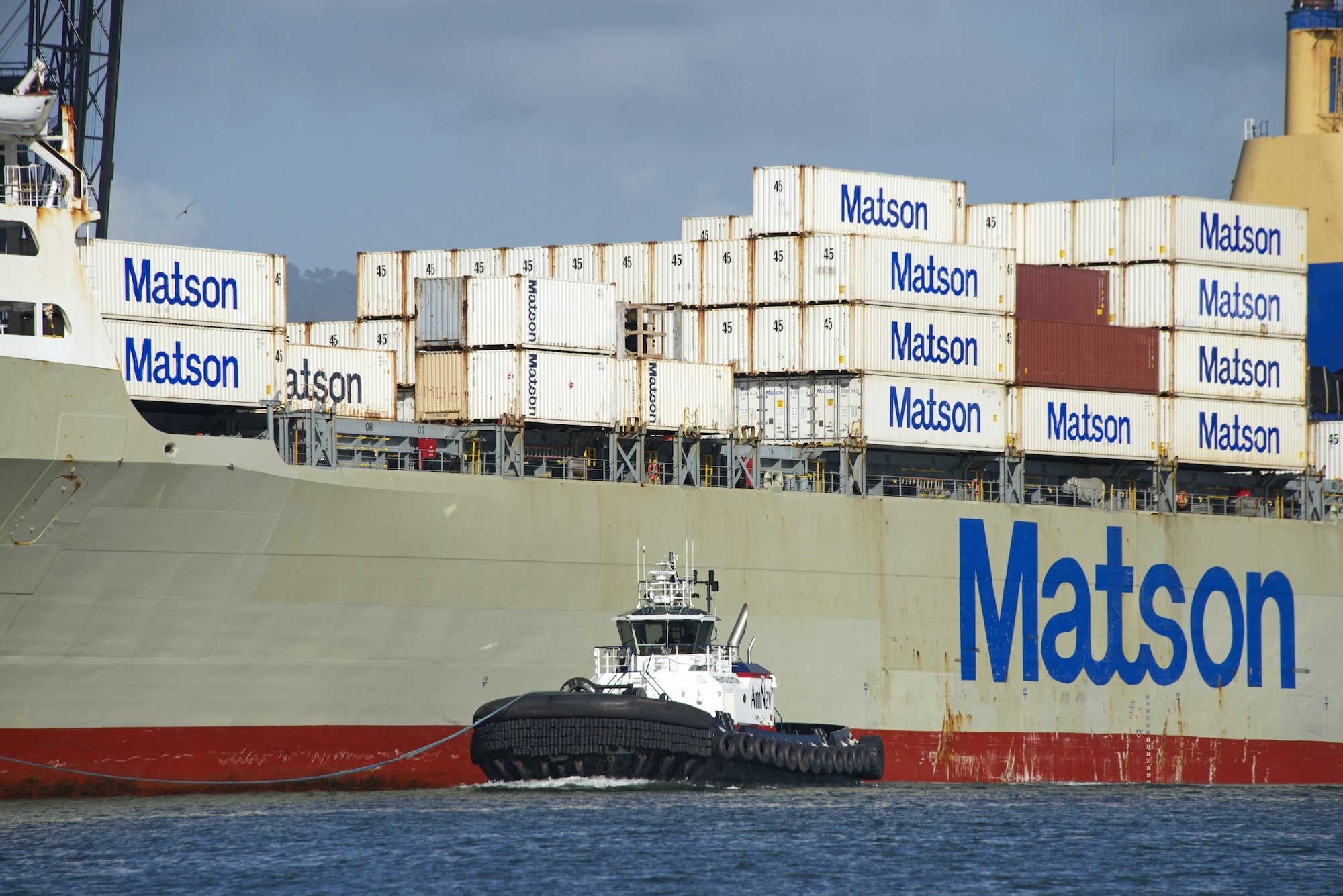M/T Florida, a 33,000 dwt Jones Act tanker. Image: Crowley
 By John Kemp
By John Kemp
LONDON, May 2 (Reuters) – The U.S. Merchant Marine Act 1920, better known to most people as the Jones Act, may be a protectionist anachronism, but there is no prospect of meaningful reform in the next few years.
The law generally requires that the maritime transport of cargo between points in the United States be carried by U.S.-flagged vessels that are at least 75 percent owned and crewed by U.S. citizens, with U.S. officers and built in U.S. shipyards.
East Coast oil refiners have started to complain that U.S. crude is being shipped from the Gulf Coast to refineries in Canada, while they have to pay four times as much in shipping costs because of the Jones Act, according to a Reuters report.
“I hear there is talk in Washington about modifying the Jones Act,” Joe Petrowski, chief executive of oil retail and wholesale group Gulf Oil, said on CNBC last week. “If that happens, it would be very good news for the industry.”
He shouldn’t hold his breath. The Obama administration and congressional Democrats have no reason to do favours for the oil industry after it supported Republicans during the 2012 election campaign.
Even without this estrangement, advocates of reform cannot marshal enough lobbying muscle to overcome entrenched resistance from the shipping industry and elements of both Congress and the Executive Branch.
BAD PUBLIC POLICY
Jones Act restrictions apply to cargo shipping between the U.S. mainland and Alaska, Hawaii and Puerto Rico; along the Atlantic, Gulf and Pacific Coasts; down the St Lawrence Seaway; and between the East and West Coasts via the Panama Canal.
Passed in the wake of the First World War, the purpose is to provide the United States with a strong fleet of merchant ships capable of serving as a naval and military auxiliary in time of war or national emergency, an efficient shipbuilding capacity, and a pool of skilled mariners and shipbuilders who can be quickly and readily mobilised.
Critics blame the act for raising the cost of coastal shipping, pushing up the cost of living on islands such as Puerto Rio and Hawaii, creating periodic shortages of specialist vessels, distorting trade flows and even hampering cleanup and fuel movements after the Deepwater Horizon oil spill and Hurricane Sandy.
Jones Act restrictions have been assailed by both liberal and conservative sources. “Like other protectionist laws, it increases the price of goods and services to American consumers,” the Washington Post warned in a 2010 editorial, though the paper admitted “how much is a matter of debate”.
“If FedEx can move cargo across the country in European-made Airbuses, why can’t a boat built in, say, Canada, ship wheat from Los Angeles to Honolulu? The Jones Act lobby crushed the last attempt at reform back in the 1990s. May the next one meet with more success,” the newspaper hoped, forlornly.
Shippers in Puerto Rico and Hawaii have complained that freight rates on routes covered by the Jones Act are higher than for longer journeys between the United States and foreign ports.
Costs may cause trade diversion. Companies in Puerto Rico told congressional investigators they sometimes purchase products from foreign countries rather than the United States because transportation charges are cheaper.
“An oil and gas importer in Puerto Rico told us that the company makes purchasing decisions based on the total price of oil and gas …(It) generally does not purchase from U.S. suppliers because the total cost is higher as a result of the differential in transportation costs,” the Government Accountability Office (GAO) wrote in a report to Congress (“Puerto Rico: characteristics of the island’s maritime trade and potential effects of modifying the Jones Act” March 2013).
NO CHANCE OF CHANGE
Like most protectionist measures, the Jones Act is bad public policy. Its objectives could be achieved more efficiently through subsidies. But that would make the costs more apparent – one reason seafarers, domestic shipping companies, legislators and many officials in the federal government are united in preferring flagging restrictions.
Even if the Jones Act is costly, there is almost no chance that the law will be changed.
The act has powerful backing from a spectrum of vested interests including U.S. vessel owners, unions, shipyards, and elements of the Defense Department and the Department of Transportation’s Maritime Administration (MARAD).
It is a classic case where the benefits of the law are concentrated on a few, while costs are borne widely. Beneficiaries have strong incentives to lobby intensively, while the much larger number of individuals who bear the costs have less incentive to do anything about it.
The act has been supported by presidents from both parties. Every one of the last five presidents has supported it. (http://www.mctf.com/statements.html)
“You … can count on me to support the Jones Act and the continued exclusion of maritime services in international trade agreements,” Barack Obama promised in a letter to the Seafarers International Union when he was running for president in 2008.
President George W Bush was similarly unequivocal when he said in 2006: “It is important for presidents to embrace the Jones Act. I have for five-and-a-half years as the president supported the Jones Act and will continue to do so.”
“My administration … continues to support the Jones Act,” President Clinton said in 1997, “as essential to the maintenance of the nation’s commercial and maritime interests.”
Even Ronald Reagan, running in 1980, was clear: “I can assure you that a Reagan administration will not support legislation that would jeopardise this long-standing policy … or the jobs dependent on it.”
COSTS AND BENEFITS
The GAO concluded its recent study about the impact on Puerto Rico ambivalently.
“Modifying the Jones Act in Puerto Rico would have uncertain effects and may result in difficult tradeoffs,” which was hardly a clarion call for change.
Lifting some or all of the restrictions on routes to Puerto Rico might cut freight rates by introducing foreign competition, though foreign carriers choosing to enter U.S. markets would find themselves subject to U.S. laws, so the cost advantage might be small. In any event, it would probably set off a wave of consolidation and force higher-cost operators to exit from the market, so lower temporarily lower freight rates might not be sustained.
Repealing the restrictions would almost certainly harm domestic shipbuilders, with some impact on military preparedness, but the impact is difficult to quantify.
Beyond Puerto Rico, the GAO has not been asked to do a full study of the act since 1998, indicating just how far down the policy agenda modifying the Jones Act has slipped.
WAIVERS NOT REPEAL
In practice, there is strong support for maintaining the Jones Act, with the president issuing temporary waivers in the event of emergencies when there is not enough shipping to meet a sudden surge in demand.
President Bush waived the act for 19 days following Hurricane Katrina in 2005. The Obama administration issued waivers in 2011 to facilitate the release of emergency oil from the Strategic Petroleum Reserve (SPR); then again in 2012 to aid fuel transfers to the Northeast after Hurricane Sandy.
Shipowners and maritime unions have generally not opposed temporary, narrowly defined waivers, provided they are clearly a last resort.
The 2011 oil release provides the best case study. The initial invitation issued by the Department of Energy promised SPR buyers a blanket exemption from the Jones Act to allow them to carry crude away in foreign-flagged tankers. However, it was amended within 24 hours to remove references to the blanket waiver. Officials had forgotten to check with the White House, where the president’s advisers were reportedly furious.
A few days later, the administration published a special procedure allowing SPR purchasers to apply individually for waivers on an expedited basis and receive a decision within 48 hours, after checks that no U.S.-flagged vessels were available.
There is a revealing coda to this story. Most of the 30 million barrels of oil eventually sold was carried away by tanker, and in every case the buyer applied for and obtained an individual waiver.
East Coast refiners, traders, shippers and policy wonks may not like the law, but they do not have the lobbying muscle to repeal it. (editing by Jane Baird)
(John Kemp is a Reuters market analyst. The views expressed are his own)
(c) 2013 Thomson Reuters, Click For Restrictions
Editorial Standards · Corrections · About gCaptain
This article contains reporting from Reuters, published under license.

 Join The Club
Join The Club



![The Jones Act is Here to Stay [COLUMN]](https://gcaptain.com/wp-content/uploads/2012/11/american-maritime-partnership-will-not-oppose-jones-act-waivers-for-sandy.jpeg)







